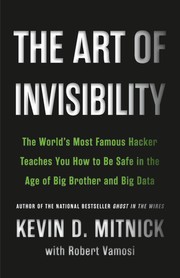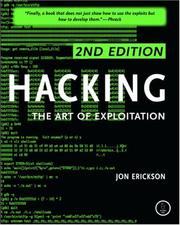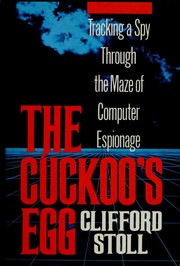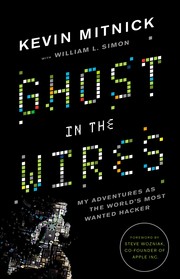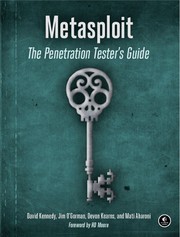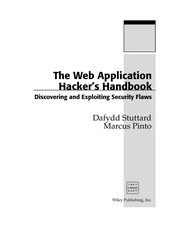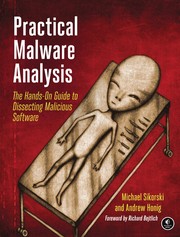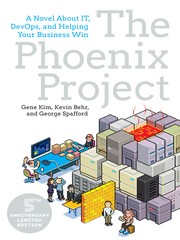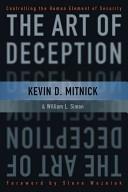Looking to delve into the world of cybersecurity? Whether you’re a beginner or an expert, finding the right book on cybersecurity is essential. With a plethora of options available, it can be overwhelming to choose the best one. That’s why we’ve compiled a list of the 20 best cybersecurity books that cover everything from basic concepts to advanced techniques. These books will equip you with the knowledge and skills needed to navigate the ever-evolving landscape of cybersecurity.
Contents
- 1 20 Best Books About Cybersecurity
- 2 The Art of Invisibility
- 3 Click Here to Kill Everybody
- 4 Hacking: The Art of Exploitation
- 5 The Cuckoo’s Egg
- 6 Ghost in the Wires
- 7 Sandworm
- 8 Metasploit: The Penetration Tester’s Guide
- 9 The Code Book
- 10 The Web Application Hacker’s Handbook
- 11 Social Engineering: The Art of Human Hacking
- 12 Practical Malware Analysis
- 13 The Phoenix Project
- 14 The Fifth Domain
- 15 The Cyber Effect
- 16 The Perfect Weapon
- 17 The Tangled Web
- 18 The Art of Deception
- 19 Countdown to Zero Day
- 20 Black Hat Python
- 21 The Shellcoder’s Handbook
- 22 Conclusion
- 23
- 24 Explore 20 Best Law Of Assumption Books with Our 2024 Update
- 25 Explore 20 Best Diplomacy Books with Our 2024 Update
- 26 Discover Best Conflict Resolution Books: 20 Key Titles, 2024 Updated
20 Best Books About Cybersecurity
The Art of Invisibility
by Kevin Mitnick
The Art of Invisibility by Kevin Mitnick is a must-read for anyone concerned about their online privacy and security. This groundbreaking book on cybersecurity provides readers with valuable insights into the world of digital surveillance, hacking, and identity theft. Mitnick, a former hacker turned security consultant, offers practical tips and techniques for protecting your personal information and staying invisible in the digital age.
With real-life examples and easy-to-understand explanations, The Art of Invisibility is not just another book about cybersecurity. It’s a comprehensive guide that empowers readers to take control of their online presence and safeguard their digital identity. Whether you’re a tech-savvy individual or someone new to the world of cybersecurity, this book will equip you with the knowledge and tools to navigate the digital world safely and securely.
Click Here to Kill Everybody
by Bruce Schneier
Click Here to Kill Everybody by Bruce Schneier is a riveting book on cybersecurity that delves into the dangerous implications of our increasingly interconnected world. Schneier explores the vulnerabilities of the Internet of Things and the potential for catastrophic cyber attacks on everything from medical devices to infrastructure. With his expert insight, he outlines the urgent need for stronger security measures and regulations to protect society from these looming threats. This thought-provoking book about cybersecurity serves as a wake-up call, shedding light on the critical importance of securing our digital infrastructure in the face of evolving technology and growing risks. Schneier’s compelling analysis makes Click Here to Kill Everybody a must-read for anyone concerned about the impact of technology on our safety and security.
Hacking: The Art of Exploitation
by Jon Erickson
Hacking: The Art of Exploitation by Jon Erickson is a must-read for anyone interested in the world of ethical hacking and cybersecurity. This book delves deep into the technical aspects of hacking, providing a comprehensive guide on how to exploit computer systems and networks. Erickson’s approach is both practical and educational, making it an invaluable resource for aspiring ethical hackers and cybersecurity professionals. The book covers a wide range of topics, including programming, network protocols, and exploit development, making it a comprehensive and engaging read for anyone looking to expand their knowledge in the field. With its hands-on approach and real-world examples, Hacking: The Art of Exploitation is a must-have for anyone looking to gain a deeper understanding of cybersecurity and ethical hacking.
The Cuckoo’s Egg
by Clifford Stoll
The Cuckoo’s Egg by Clifford Stoll is a captivating non-fiction book about cybersecurity that reads like a thrilling detective story. Stoll, an astronomer turned computer expert, takes readers on a gripping journey as he discovers a hacker infiltrating the computer systems at Lawrence Berkeley National Laboratory. With meticulous attention to detail, Stoll traces the hacker’s movements, uncovering a web of espionage and international intrigue.
This cybersecurity book provides a fascinating insight into the world of computer security and the early days of cyber warfare. Stoll’s writing is both informative and entertaining, making complex technical concepts accessible to readers of all backgrounds. The Cuckoo’s Egg is a must-read for anyone interested in cybersecurity, espionage, or simply enjoys a riveting true-life thriller.
Ghost in the Wires
by Kevin Mitnick
Ghost in the Wires is a captivating memoir by Kevin Mitnick, a notorious hacker turned cybersecurity expert. This gripping book chronicles Mitnick’s early hacking exploits, his cat-and-mouse game with law enforcement, and his eventual transformation into a leading cybersecurity consultant. Through his personal experiences, Mitnick provides valuable insights into the world of cybersecurity, offering a unique perspective on the vulnerabilities of the digital age. With a mix of suspense, technical detail, and personal reflection, Ghost in the Wires is a must-read for anyone interested in the fascinating world of cybersecurity. Mitnick’s engaging storytelling and his insider knowledge make this book a compelling and informative read for anyone curious about the inner workings of the digital world.
Sandworm
by Andy Greenberg
Sandworm by Andy Greenberg is a riveting book on cybersecurity that delves into the world of cyberwarfare and the shadowy group known as Sandworm. Greenberg takes readers on a thrilling journey through some of the most consequential cyberattacks in recent history, including the infamous NotPetya attack that caused billions of dollars in damage. With meticulous research and compelling storytelling, Greenberg exposes the inner workings of this cyber threat and the geopolitical implications of these attacks. This book about cybersecurity is a must-read for anyone interested in the intersection of technology, security, and international relations. It’s a chilling and eye-opening account of the new frontier of warfare in the digital age.
Metasploit: The Penetration Tester’s Guide
by David Kennedy
Metasploit: The Penetration Tester’s Guide by David Kennedy is an essential book for anyone looking to delve into the world of ethical hacking and penetration testing. This comprehensive book on cybersecurity provides a detailed overview of the Metasploit framework, including its tools and techniques for exploiting security vulnerabilities. Readers will learn how to use Metasploit to discover, exploit, and secure systems, making it an invaluable resource for both beginners and experienced professionals in the field of cybersecurity. Kennedy’s expertise and clear writing style make this cybersecurity book an engaging and practical guide for anyone looking to enhance their skills and knowledge in the realm of ethical hacking and penetration testing.
The Code Book
by Simon Singh
The Code Book by Simon Singh is a fascinating exploration of the history and impact of cryptography, the art of writing and solving codes. This engaging book takes readers on a journey through the evolution of codes and ciphers, from ancient times to the modern era. It delves into the stories of codebreakers and their incredible achievements, such as cracking the Enigma machine during World War II. With a perfect blend of history, science, and technology, this book offers a captivating look at the world of secret communication and the vital role it has played in shaping our past and present. Whether you’re a history buff, a tech enthusiast, or simply intrigued by the world of secret messages, The Code Book is a must-read for anyone interested in the art of encryption and cybersecurity.
The Web Application Hacker’s Handbook
by Dafydd Stuttard
The Web Application Hacker’s Handbook by Dafydd Stuttard is a comprehensive guide for anyone looking to understand the ins and outs of web application security. This book on cybersecurity delves into the world of hacking and provides valuable insights into how attackers exploit vulnerabilities in web applications. From understanding the basics of web security to advanced hacking techniques, this cybersecurity book covers it all. Stuttard offers practical examples and real-world scenarios to help readers grasp the concepts and techniques effectively. Whether you’re a beginner or an experienced professional, this book about cybersecurity is a must-read for anyone interested in learning about web application security and how to defend against cyber threats.
Social Engineering: The Art of Human Hacking
by Christopher Hadnagy
Social Engineering: The Art of Human Hacking by Christopher Hadnagy is a captivating book on cybersecurity that delves into the psychology and techniques of manipulating people to gain unauthorized access to sensitive information. Hadnagy takes readers on a fascinating journey through the world of social engineering, exploring the various tactics used by hackers to exploit human behavior and trust. The book provides valuable insights into the mindset of both attackers and potential targets, offering practical advice on how to recognize and defend against social engineering attacks. With real-world examples and actionable strategies, this cybersecurity book is an essential resource for anyone looking to enhance their understanding of human vulnerabilities in the digital age.
Practical Malware Analysis
by Michael Sikorski
Practical Malware Analysis by Michael Sikorski is a comprehensive guide for aspiring analysts and security professionals looking to delve into the fascinating world of digital threats. This in-depth book on cybersecurity provides a hands-on approach to dissecting and understanding malicious software, equipping readers with the necessary knowledge and tools to combat cyber threats effectively. With a focus on practical techniques and real-world examples, the book about cybersecurity covers essential topics such as malware behavior analysis, memory forensics, and reverse engineering. Sikorski’s expertise shines through as he navigates readers through the complexities of malware analysis, making it an indispensable resource for anyone seeking to enhance their understanding of cybersecurity. Practical Malware Analysis is a must-read for those looking to gain a deeper insight into the ever-evolving landscape of digital security.
The Phoenix Project
by Gene Kim, Kevin Behr, and George Spafford
The Phoenix Project is a captivating book about cybersecurity that takes readers on a journey through the challenges of IT management and operations. Written by Gene Kim, Kevin Behr, and George Spafford, this book follows the story of an IT manager who is tasked with turning around a failing project. As he navigates through the chaos of the organization, he learns valuable lessons about effective leadership, teamwork, and problem-solving in the world of technology. The authors use a fictional narrative to deliver profound insights into the complexities of managing IT infrastructure and the critical role it plays in modern business. With its compelling storytelling and practical lessons, The Phoenix Project is a must-read for anyone interested in the intricacies of IT management and the importance of cybersecurity.
The Fifth Domain
by Richard A. Clarke and Robert K. Knake
The Fifth Domain by Richard A. Clarke and Robert K. Knake is a compelling book on cybersecurity that delves into the complex world of digital warfare and the threats posed by cyber attacks. The authors, both experts in national security and cyber policy, provide a comprehensive overview of the evolving landscape of cyber threats, from state-sponsored attacks to criminal hacking. They detail the potential consequences of a large-scale cyber attack on critical infrastructure and the implications for national security. The book offers valuable insights into the challenges of defending against cyber threats and the need for improved strategies and cooperation between government, industry, and individuals. The Fifth Domain is an essential read for anyone interested in understanding the current state of digital security and the ongoing battle in the cybersecurity realm.
The Cyber Effect
by Mary Aiken
The Cyber Effect by Mary Aiken is a thought-provoking book on cybersecurity that delves into the impact of the digital world on human behavior. Dr. Aiken, a renowned forensic cyberpsychologist, explores how technology is shaping our brains, relationships, and society as a whole. She examines the psychological and social consequences of our online interactions, from the way we communicate to the risks of cyberbullying and online addiction. Drawing on real-life case studies and research, Dr. Aiken offers a fascinating insight into the intersection of human psychology and technology, and the implications for our personal and collective well-being. This compelling and informative book about cybersecurity is a must-read for anyone interested in understanding the profound effects of the digital age on our lives.
The Perfect Weapon
by David E. Sanger
The Perfect Weapon by David E. Sanger is a captivating book on cybersecurity that offers a riveting exploration of the evolving world of cyber conflict. Sanger, a renowned national security correspondent, takes readers on a thrilling journey through the intricate web of global cyber warfare, revealing the high-stakes battles taking place in the digital realm.
Through in-depth research and compelling storytelling, Sanger delves into the shadowy world of cyber espionage, sabotage, and warfare, shedding light on the key players, strategies, and implications of these clandestine operations. With a keen eye for detail and a deep understanding of the subject matter, Sanger uncovers the frightening potential of cyber weapons to disrupt and destabilize entire nations.
With its gripping narrative and insightful analysis, The Perfect Weapon is a must-read for anyone interested in the complex and ever-changing landscape of cybersecurity.
The Tangled Web
by Michal Zalewski
The Tangled Web by Michal Zalewski is a captivating book about the intricate and complex world of internet security. Zalewski delves deep into the inner workings of the web, uncovering the vulnerabilities and loopholes that can be exploited by cyber attackers. With his extensive knowledge and expertise, the author provides a fascinating insight into the often overlooked aspects of web security, shedding light on the hidden dangers that lurk behind the virtual facade. Through real-world examples and case studies, Zalewski presents a thought-provoking exploration of the ever-evolving cyber landscape, making this book a must-read for anyone interested in understanding the intricacies of online security. Whether you are a seasoned professional or a curious enthusiast, The Tangled Web offers a compelling and educational journey through the labyrinth of cybersecurity.
The Art of Deception
by Kevin Mitnick and William L. Simon
The Art of Deception is a captivating cybersecurity book that delves into the world of social engineering and the art of manipulating people to gain unauthorized access to information. Written by Kevin Mitnick and William L. Simon, the book provides an insightful look into the psychological tactics used by hackers to exploit human vulnerabilities, rather than relying solely on technical means. Mitnick, a former hacker turned security consultant, shares real-life examples of how social engineering has been used to breach even the most secure systems. This eye-opening book sheds light on the importance of understanding human behavior in the realm of cybersecurity, making it a must-read for anyone interested in the intricate and often overlooked aspects of digital security.
Countdown to Zero Day
by Kim Zetter
Countdown to Zero Day by Kim Zetter is a captivating book on cybersecurity that delves into the world of cyber warfare and the infamous Stuxnet virus. Zetter takes readers on a thrilling journey through the discovery and investigation of the unprecedented cyber attack on Iran’s nuclear facilities. She provides a detailed account of the covert operation and the global implications of such a sophisticated cyber weapon. With meticulous research and compelling storytelling, Zetter offers a comprehensive look at the escalating cyber arms race and the vulnerabilities of our interconnected world. This gripping book about cybersecurity is a must-read for anyone interested in the intersection of technology, politics, and national security.
Black Hat Python
by Justin Seitz
Black Hat Python by Justin Seitz is a captivating book on cybersecurity that delves into the world of offensive hacking using Python. Seitz’s expertise in the field shines through as he guides readers through various techniques for writing Python scripts to exploit network vulnerabilities, manipulate web applications, and even create their own backdoors. The book gives a unique perspective on using Python for offensive purposes, making it a valuable resource for anyone interested in the darker side of cybersecurity. With practical examples and real-world scenarios, Black Hat Python is a must-read for aspiring ethical hackers, security professionals, and anyone fascinated by the inner workings of cyber attacks. Seitz’s clear writing style and hands-on approach make this cybersecurity book an essential addition to any hacker’s library.
The Shellcoder’s Handbook
by Chris Anley, John Heasman, Felix Lindner, and Gerardo Richarte
The Shellcoder’s Handbook is a comprehensive guide for those interested in the realm of computer security. Written by Chris Anley, John Heasman, Felix Lindner, and Gerardo Richarte, this book delves into the world of hacking and provides valuable insights into the techniques and tools used by hackers and cybersecurity professionals alike. This cybersecurity book explores the intricacies of shellcode, exploit development, and reverse engineering, making it an essential resource for anyone looking to understand the inner workings of malicious code and how to defend against it. With its practical approach and in-depth coverage of the subject matter, The Shellcoder’s Handbook is a must-read for aspiring ethical hackers, cybersecurity professionals, and anyone intrigued by the world of computer security.
Conclusion
With cyber threats on the rise, it’s more important than ever to stay informed about Cybersecurity. The 20 best books about cybersecurity listed in this article provide valuable insights and strategies to protect yourself and your organization from online threats. Whether you’re a beginner or an expert in the field, these books offer a wealth of knowledge to help you navigate the complex world of cybersecurity. Happy reading and stay safe online!
Which Cybersecurity book is best?
The best book on Cybersecurity can vary with personal preference, but three widely recommended titles are:
- The Art of Invisibility by Kevin Mitnick,
- Click Here to Kill Everybody by Bruce Schneier,
- Hacking: The Art of Exploitation by Jon Erickson.
Each offers valuable insights and could be a great starting point.
What are the best books to learn about Cybersecurity?
For those looking to learn about Cybersecurity, there is a wealth of literature that can provide a comprehensive understanding of the subject. Some of the most highly recommended books include:
- The Art of Invisibility by Kevin Mitnick,
- Click Here to Kill Everybody by Bruce Schneier,
- Hacking: The Art of Exploitation by Jon Erickson,
- The Cuckoo’s Egg by Clifford Stoll,
- Ghost in the Wires by Kevin Mitnick,
- Sandworm by Andy Greenberg,
- Metasploit: The Penetration Tester’s Guide by David Kennedy,
- The Code Book by Simon Singh,
- The Web Application Hacker’s Handbook by Dafydd Stuttard,
- Social Engineering: The Art of Human Hacking by Christopher Hadnagy
These books offer a range of perspectives on Cybersecurity, covering various aspects and approaches to the subject.
What are the best books on Cybersecurity?
The best books on Cybersecurity include:
- The Art of Invisibility by Kevin Mitnick,
- Click Here to Kill Everybody by Bruce Schneier,
- Practical Malware Analysis by Michael Sikorski,
- The Phoenix Project by Gene Kim, Kevin Behr, and George Spafford,
- The Code Book by Simon Singh,
- Sandworm by Andy Greenberg.
Each offers unique insights into the subject. While these books on the topic of Cybersecurity are highly regarded, it’s important to note that any list of ‘best’ books is subjective and reflects a range of opinions.
What are the best Cybersecurity books of all time?
Choosing the best Cybersecurity books of all time can vary depending on who you ask, but seven titles that are often celebrated include
- The Art of Invisibility by Kevin Mitnick,
- Click Here to Kill Everybody by Bruce Schneier,
- Ghost in the Wires by Kevin Mitnick,
- The Code Book by Simon Singh,
- Social Engineering: The Art of Human Hacking by Christopher Hadnagy,
- The Phoenix Project by Gene Kim, Kevin Behr, and George Spafford,
- and Practical Malware Analysis by Michael Sikorski.
Each of these books has made a significant impact in the field of Cybersecurity and continues to be influential today.

